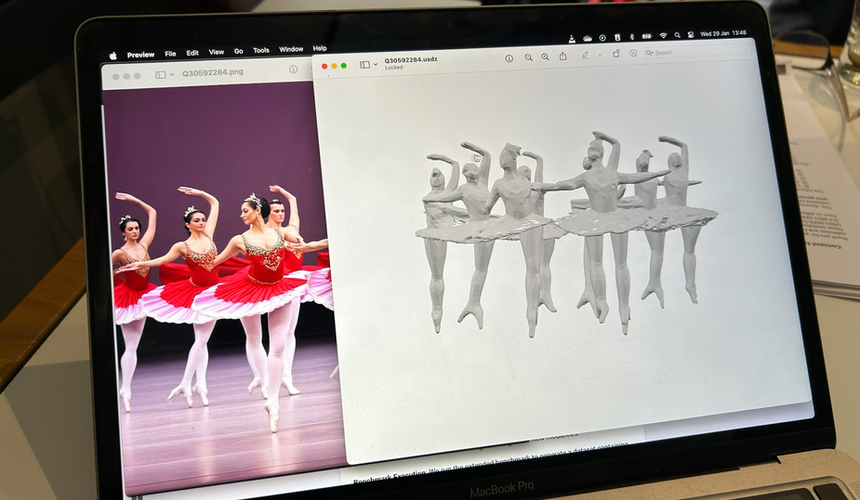[News] Last Year in the Corner – Reflecting on Our London Meeting
- michaelculture
- Feb 18
- 3 min read
Updated: Mar 17
Last month, we gathered in the beautiful premises of King’s College London for a highly productive consortium meeting. This gathering was not only an opportunity to take stock of our collective achievements but also a crucial moment to strategise for the exciting final stretch of our project!
Looking Ahead: Planning the Final 10 Months
As MuseIT enters its final 10 months, our focus is on reaching key milestones, particularly our two upcoming pilots in Rome (May 2025) and in Sweden (June 2025). These pilots will play a crucial role in testing and improving our innovations with our target audiences, including individuals of all abilities and cultural professionals.
Our first pilot, hosted at the Ministry of Culture (Roma, May 2025), will focus on test and feedback integration of the work we've carried out on multisensory representations that enhance the experience of cultural assets. The demonstration will integrate: haptic devices (Haptic vest, HaptiVerse,etc.); immersive experiences, especially our multisensory virtual exhibition and interactive engagement with the MuseIT repository. Our second pilot, led by ShareMusic in Sweden, will focus on testing the remote musical co-creation platform with musicians, putting our research on participatory and inclusive approaches into practice.
For both pilots, the objective is to gather feedback from our target groups—people with disabilities and cultural organisations—to refine and enhance our work.
Beyond these pilots, we are also working toward finalising two significant outcomes: the MuseIT platform and the MuseIT repository. This consortium meeting allowed us to refine our roadmap and align our efforts for the months ahead.
Showcasing Our Work and Gathering Feedback
On the third day of our consortium meeting, we had the privilege of presenting our technologies to professionals, including people with disabilities. Attendees engaged with:
Our music co-creation tools with show and dell;
Our haptic work ( HaptiDesigner, HaptiMux, and streaming haptograms);
Our virtual exhibition and multisensory interactions.
A highlight of the day was the valuable feedback from Femke Krieger and Raymond Holt, members of the project's advisory board, who tested our prototypes alongside other participants. Why is this important to us? Because MuseIT’s design process is deeply rooted in user feedback, ensuring our technologies are as inclusive and effective as possible.
We were also honored to organise a workshop on inclusive language, hosted by Dr. Barbara McGillivray (KCL). This session focused on annotating the History of Disabilities collection to trace the evolution of disability-related terminology. Understanding how language changes over time, especially when it comes to potentially derogatory terms, is essential to fostering a more inclusive society and ensuring our technologies reflect that inclusivity.
Our dear colleagues from King’s College London hosted another workshop on evaluating multimodal transformations. In MuseIT, they explore how modern generative AI tools can be leveraged to provide automatic representations of data that cater to different user needs, based on their sensory capabilities. That means using AI and language models to generate different sensory representations of cultural assets, such as sound, text, 3D and Image. The goal of the workshop was to assess the accuracy of the generated modalities.
A Bonus: Attending the DMLab London Event
To top off an already enriching week, we attended Drake Music Lab London’s event in Rich Mix London, a vibrant space where musicians, technologists, and makers came together to explore accessible musical creation. A major highlight was the MiMU Glove technology: wearable gloves musical instrument for expressive performance. The event featured inspiring presentations and performances from Amble Skuse & Bosko Begovic; Kris Halpin; and Rylan Gleave. This gathering provided not only networking opportunities but also hands-on experiences with Drake Music’s Accessible Musical Activities, reinforcing our commitment to share best practices with actors working on accessible technologies.

Looking Forward
As we move toward the final stages of MuseIT, we remain dedicated to co-creation, accessibility, and innovation. Our London consortium meeting was a powerful reminder of what we’ve accomplished so far, and the exciting work still ahead.
A key focus for the coming months will be transferring our results, learnings, and lessons to our target groups. We are committed to ensuring that our findings don’t just stay within the consortium but reach those who can truly benefit. This means:
Actively participating in events
Organising our own activities to share insights
Making sure all our findings are stored, documented, and effectively transferred
Communicate actively
Additionally, our policy work is still ongoing. We will be delivering two more policy recommendations and guidelines for professionals, helping shape more inclusive practices in cultural and technological fields.
The next 10 months will be intense, but we are excited about the impact we can create.
Stay tuned as we bring MuseIT’s work into its final and most transformative phase!











Comments